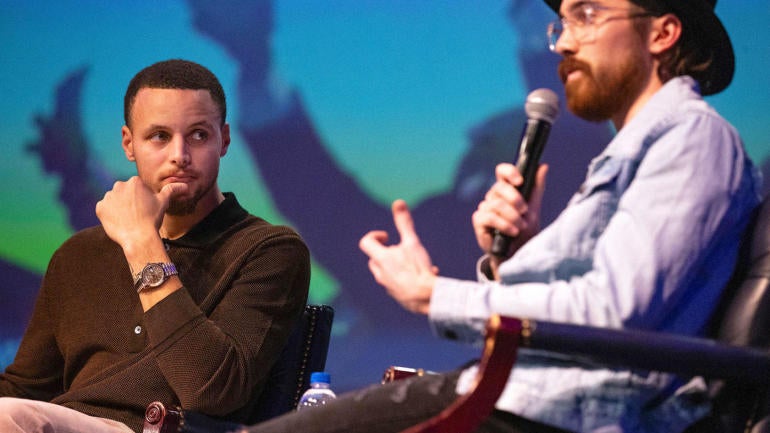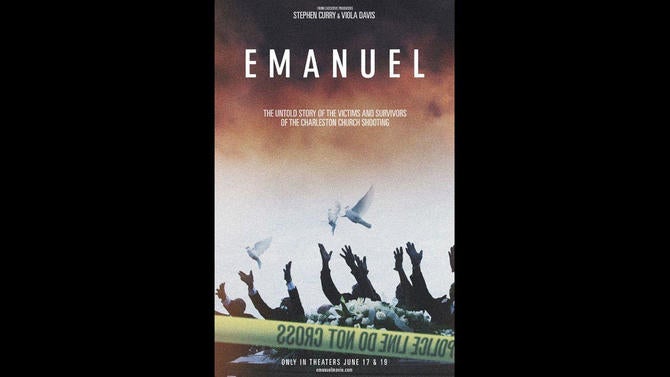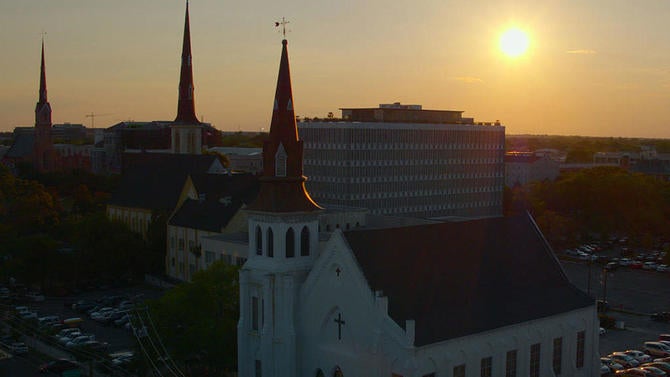
Stephen Curry is at the climax of his fifth NBA Finals appearance in five years with the Golden State Warriors -- the second-longest Finals streak for a team in league history -- and regardless of whether they win their third straight title, his place in basketball lore is secure.
The 31-year-old point guard has transcended not only his own franchise, one of the game's most notorious "super-team" dynasties, but the entire sports landscape. For a half-decade now, his royal blue No. 30 has been internationally recognizable, right up there with the No. 23s of Michael Jordan and LeBron James. He's single-handedly spearheaded basketball's 3-point era with some of the best, most improbable shooting the game has ever seen.
But Curry has long strove to extend his legacy beyond the hardwood, and his biggest opportunity to do that arrives after the Finals, on June 17.
That date marks the fourth anniversary of the Charleston church shooting, when Dylann Roof, a 21-year-old white supremacist, murdered nine black South Carolinians during a Bible study. "Emanuel," Curry's award-winning documentary that chronicles the tragedy, will be released on the anniversary. It pays tribute to the victims and highlights the unlikely response of its survivors.
Since unveiling Unanimous Media, his own Sony Pictures-backed production company, in April 2018, the Warriors star has been proactive in bringing his core priorities -- faith, family and sports -- to the entertainment scene. But none of his earliest projects have generated more internal acclaim -- and better promised to further his legacy -- than "Emanuel."

Unanimous, named after Curry becoming the NBA's first unanimous MVP in 2016, is still reaping the rewards of its first feature film, the 20th Century Fox-distributed "Breakthrough," a Christian drama that's grossed more than $50 million.
"Emanuel" carries more weight, both in the heaviness of its story and the loftiness of its support. Curry signed on as executive producer in November 2018 alongside Academy Award-winning actor Viola Davis ("The Help," "Fences"), and before that, the 75-minute doc had already claimed awards at DOC NYC and Heartland International Film Festival.
Through interviews with survivors and family members, the film recounts the pain inflicted by Roof on that summer day in 2015 -- the quiet stillness of a closing prayer interrupted by the gunshots of a man aiming to ignite a race war. But as Unanimous CEO and Curry business partner Jeron Smith says, the film "is not a story about Dylann Roof."
"It powerfully weaves together race relations, family, community, and, of course, faith," Smith explains. "I can't think of another film that aligns with our mission and vision more than 'Emanuel.' We created Unanimous and entered the entertainment space to tell stories like this. We want our projects to spark larger cultural conversations -- 'Emanuel' is a perfect example."

The documentary's broader picture of cultural commotion includes background on Charleston, where 40 percent of all Africans forcibly imported as slaves were believed to have entered America; and the site of the shooting, "Mother" Emanuel African Methodist Episcopal Church, which has tied faith to activism in everything from a planned 1800s slave rebellion to a 1960s Martin Luther King Jr. partnership to a 2015 rally protesting the North Charleston police shooting of Walter Scott.
Most notably, however, it centers on the way the families of the "Emanuel Nine" victims responded to their losses.
A divine forgiveness
Chris Singleton pauses before he speaks, deliberating for a moment how much he cares to retell.
"I remember everything from that night," he finally says. "I remember what clothes I was wearing, where I parked at, the face of the officer who said, 'You can't park there.' And I probably won't ever be able to forget the officer who told me my mother was murdered."
Chris is now married with a child of his own, but he was only 18 when his mom, Sharonda Coleman-Singleton, was shot and killed at "Mother" Emanuel. Sharonda was a speech pathologist, high-school track coach and assistant pastor at the church at the time of her death, not to mention a wife and mother to Chris' two siblings. Her story is just one of many memorialized in the documentary -- just one tragedy that has inexplicably incited not lust for revenge, but love for her killer.
A former Chicago Cubs draft pick who now promotes race reconciliation as an inspirational speaker, Chris is clear he still carries the scars of his mother's murder.
"I feel like some people think it's no longer in your mind, it's washed away," he says, "but I'll never forget what happened to my mom ... I don't think I could ever really feel -- I don't want to say empathy -- for the guy. I think there's no excuse for it at all."
And yet Singleton is best known for publicly forgiving Roof less than 24 hours after his mom's death, telling the local news that "love is always stronger than hate."

His day-after reaction was reminiscent of a Lancaster County, Pennsylvania, Amish community, which famously forgave the man who killed five of their children in a 2006 schoolhouse shooting. Unlike the Amish, who sought to uphold a biblical command, Singleton says his forgiveness was "a personal choice to be without anger," not "just something for faith."
Now a devout follower of Jesus, his ultimate model for forgiveness, Chris refuses to believe his first extension of grace back in 2015 was anything but divinely orchestrated.
"I don't even know how to describe it," he says. "But that's how I know it wasn't just me making that decision. I can't just sit here and say I did it. I know for a fact it wasn't just me."
And Chris was not the only one to choose love over a multitude of other actions and emotions -- many of which arguably would've been more reasonable in the wake of such horror. Countless friends and family members of victims echoed Singleton's forgiveness to Roof firsthand at the killer's initial court hearing and again, years later, at his sentencing.
To have Curry committed to raising awareness of it all through "Emanuel" was a godsend to Singleton, who appears in the film.
"It means the world to me," he says. "I look up to him as an athlete but also as a person and as a believer."
But there's also no greater privilege for Curry, what with his off-court mission, than to further recognize those who gave so much -- both in losing their family and in extending grace -- through the story.
"We hope audiences are as moved by the film as we were," says Curry's partner, Jeron Smith. "We came on board to ensure it got the recognition it deserved ... It highlights the tremendous benchmarks of humanity that came from a horrible tragedy and how it brought a community together."
Like the rest of the documentary's producers, all of Curry's proceeds from "Emanuel" will go directly to the Charleston shooting survivors and victims' families. And if it weren't for those families, the movie wouldn't have been made at all.
"I didn't want to tell the story at all, at first," director Brian Ivie explains. "When I heard about the shooting, I was on my honeymoon. One of the greatest moments of my life collided with one of the worst moments of someone else's life. But that is what life is actually like -- very broken and fractured. I stayed away from it for a year, tried to do 10 other different projects."
Eventually, one of Ivie's friends told him he had been part of the tragedy. He was an area pastor and one of the first responders to the shooting, one of the few clergy allowed on the crime scene. Before long, Ivie was in touch with the families, who encouraged him to share the hope they'd already offered their loved ones' murderer.
Countering the culture
All parties involved agree: "Emanuel" is a movie for the times.
The Charleston church shooting was the incident that prompted major retailers to stop selling the Confederate flag, which Roof admired for its association with segregation. Four years later, six in 10 Americans think U.S. race relations are bad, according to Pew Research, and 65 percent of all citizens say it has become more common for people to express racist or racially insensitive views in recent years.
Former President Barack Obama can be seen in the documentary singing "Amazing Grace" while delivering the eulogy for "Mother" Emanuel's slain pastor, offering a simple retort to Roof's efforts to incite division: "Oh, but God works in mysterious ways." Four years later, even prominent church leaders admit the basis for songs like "Amazing Grace" -- their Christian faith, or evangelicalism -- is being severely misrepresented in America by hypocrisy, immoral character, ignorance of race relations and so forth.
In his eulogy for Rev. Pinckney, President @BarackObama reminded a city and a nation that even in our worst moments, God is still in control. See #EMANUELmovie in theaters either June 17 or 19. Find tickets at https://t.co/s113sFR6xj pic.twitter.com/q6pqEcHd7L
— Emanuel (@EmanuelTheMovie) June 2, 2019
Race and religion, then, are at the forefront of the film. But Curry, Ivie and everyone else involved in the production didn't retell this particular story just to remind people the world has problems in those areas. They hope, as Ivie says plainly, that audiences will "see that God is real and that He participates in our suffering."
Sound preachy? Ivie was in the same boat just a few years ago.
"Evangelicals were like the children of the corn to me," he says. "They foamed at the mouth. I wanted nothing to do with Christianity."
But then he got behind the lens. Then he saw people like those featured in "Emanuel."
"That, to me, looked a lot more like the Jesus they told me about in Sunday School," he says. "What I see in these people is the real thing ... the idea of sacrificial spirit, which is the highest form of love -- 'love your enemy,' a love that absorbs and bears the full weight of a wrong."
Is it any wonder now why Curry attached himself to the project?
"For Steph, who's a Christian, and very unapologetically, the reason why he loved this movie is because it's who he is and the way he wants to live," Ivie says, gushingly. "He makes God accessible. Having him was honestly a dream come true for me, because he's an entertainer, but he's one of the few people who makes God seem like somebody we can be with."
So Curry's mission isn't just to raise awareness of those lost to tragedy and those who responded to it heroically. It's to bring some of their light into a dark world. Much like his basketball legacy was birthed not by mimicking the LeBrons and Jordans before him but by embracing his own very different shot, he's just going about it in a counter-cultural way -- by promoting sacrifice and selflessness in an age of mere "tolerance" and self-liberation.
"The narrative of our culture is essentially Sprite -- 'Obey Your Thirst,'" Ivie says. "There's not a lot else to it, and I tried to live like that for a while. The problem is, I hurt myself way more than anybody else did. The basic premise of Christianity -- and this is why it's so offensive, is because it says we cannot fix ourselves. We will not express ourselves into finding liberation."
Starting the conversation
Distributed by Fathom Events, "Emanuel" will only be in theaters for two days: on June 17 and June 19.
There is a reason for that.
"It's event cinema," explains Katie Sawyer-Stachler, Fathom's director of programming. "We really want to make it an event where people come together versus just going to a movie theater and seeing it on any given Friday night with people they don't have a relationship with."
In other words, "Emanuel" will celebrate community in part by encouraging community -- flesh-and-blood friends, family, churches and so forth.
Fathom first caught wind of "Emanuel" in 2017, two years after working with Ivie for encore screenings of "The Drop Box," his award-winning documentary on a South Korean pastor who created a literal drop box for abandoned babies. All they needed was to see a trailer of his newest, then-unfinished doc to know they wanted to be attached. Their Colorado headquarters' proximity to past shootings in Aurora and Columbine brought the movie and its message even closer to home.
Fathom officially struck a nearly 900-theater distribution deal late in 2018, and by that time, Curry had joined the team, having discussed "Emanuel" with Ivie at one of the first-ever Unanimous company meetings.

"Stephen played a major role in the marketing and promotion of the film," says Jeron Smith, "raising money for the families and in securing partners. The power of Stephen's brand is incredibly strong, and he brings a ton of value to partners because of the size of his platform and how he transcends the world of sport."
Moving forward, Sawyer-Stachler says the "Emanuel" crew is "eyeing to do an Oscar run in New York and L.A.," and Ivie says the movie will arrive on home video, Amazon and other streaming services through Universal Pictures starting Sept. 3. But the film's two-day theater run is where everyone hopes the national conversation will begin -- face-to-face -- complete with a bonus discussion between Ivie and Curry that is exclusive to Fathom Events' showings.
When all is said and done, more awards may have arrived. Critics may have buzzed. Audiences may have been stirred. Curry may have even gotten another ring.
But one thing has already been made clear: The athlete behind "Emanuel" is not just an athlete. Not by a long shot.
"He's a basketball player," says Sawyer-Stachler, "but more so, he's a man of God, and it shows."
"Emanuel" opens on June 17, with showings on the 17th and 19th at select locations. Tickets can be purchased at EmanuelMovie.com.


















